Top 10 Scheduling Appointment Apps for Business Success in 2026
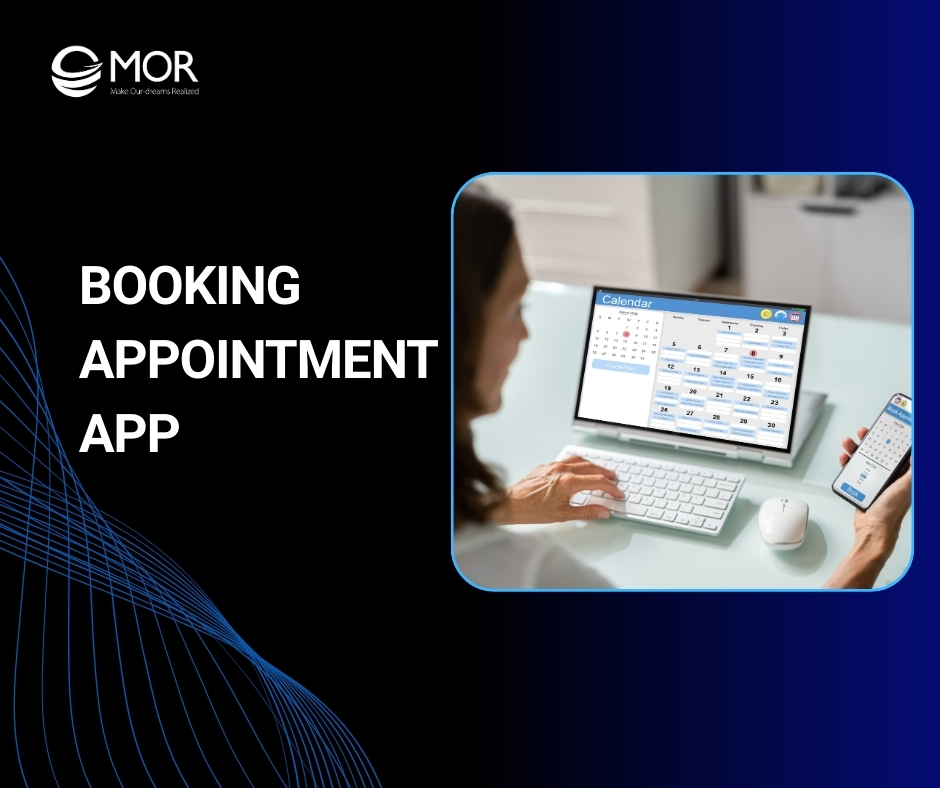
Finding the right booking appointment app can feel overwhelming when every tool claims to save you time. Many businesses also need a free appointment booking app that’s simple yet reliable. This MOR Software’s guide will walk you through the top choices in 2025 and help you decide which one truly fits your business needs.
What Is A Booking Appointment App?
A booking appointment app is a digital tool that manages scheduling between businesses and clients. It allows both sides to create, adjust, or cancel appointments directly online without back-and-forth phone calls or emails.
Most apps connect with existing calendars, making it easy to keep schedules aligned. They also send automated reminders and notifications so appointments are not missed.
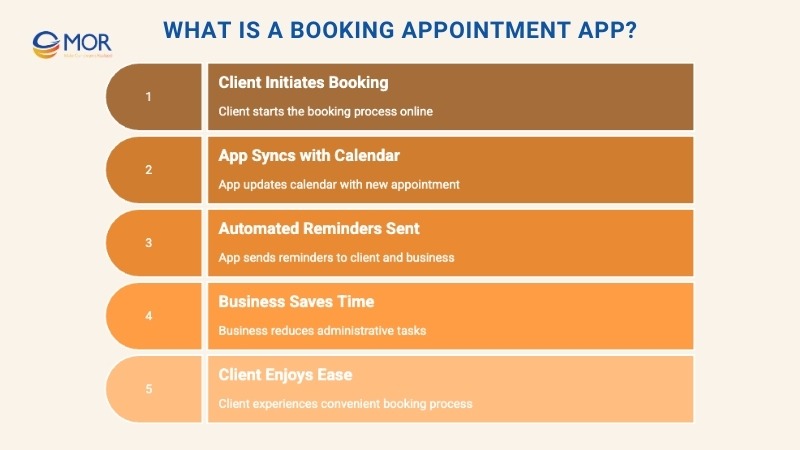
For companies, this reduces repetitive admin work, lowers the chance of scheduling mistakes, and improves service quality. For customers, it’s simply more convenient. They can confirm a time in just a few clicks instead of waiting for manual responses.
In the U.S., 91% of adults now own a smartphone, so mobile-friendly booking and reminders reliably reach most people.
How Does Appointment Scheduling App Work?
Instead of juggling long email chains to confirm a time, a booking appointment app lets you share a scheduling link and have clients pick a slot that matches your availability.
These tools usually come with practical functions like calendar sync, time zone detection, and automated reminders by email or SMS. That means fewer missed meetings and no risk of double-booking.
A BMJ Open meta-analysis found that text reminders made patients 23% more likely to attend and reduced no-shows by 25%. This shows how simple notifications materially improve attendance in appointment-based settings.
In short, a client scheduling app keeps your calendar running on autopilot. It saves hours of manual work and helps you stay organized, whether you’re setting up client calls, team meetings, or personal catch-ups.
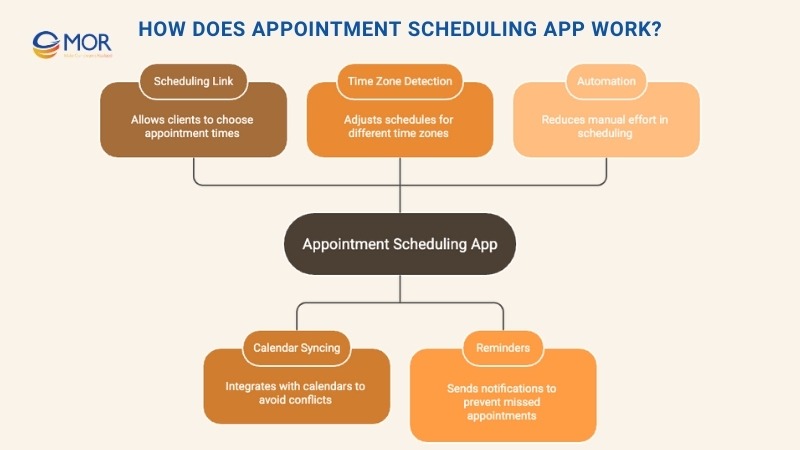
Why Do Businesses Need An Appointment Booking App?
Time is one of the most valuable resources for any company. Handling schedules through phone calls, emails, or paperwork often slows things down and leaves room for errors. A booking appointment app solves these issues by making the entire process faster and more accurate.
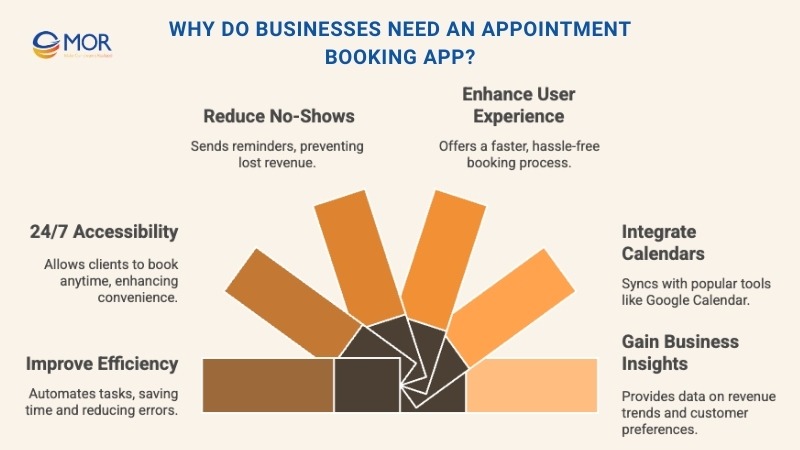
Improved Efficiency
Setting appointments, sending reminders, or canceling meetings manually can take up hours of staff time. Online booking apps automate these tasks, saving effort for both the business and the client.
24/7 Accessibility
Because scheduling doesn’t rely on staff availability, customers can book their spot anytime, day or night. This flexibility improves convenience and reduces missed opportunities for new business.
In healthcare, for example, nearly 60% of appointments are booked outside office hours, a clear signal that many people schedule when staff are offline.
Reduced No-Shows
A booking appointment app sends reminders by email, text, or push notification before a meeting. This keeps clients on track, lowers the chance of missed sessions, and helps avoid lost revenue. Missed appointments add up, with NHS England estimating over £216 million lost in a single year because patients did not attend GP visits.
Enhanced User Experience
The booking process becomes smooth and simple. Customers don’t face the hassle of repeated calls or back-and-forth messages, which builds trust and encourages loyalty.
Even in B2B, buyers now split their preferences roughly into thirds across in-person, remote, and digital self-serve interactions. This shows the value of offering simple self-booking alongside human support.
Integration With Calendars
Most appointment scheduling apps connect directly with Google Calendar, Outlook, or other tools. This keeps everything synced, so businesses and clients always have the same updated view.
Business Insights
Beyond scheduling, many apps capture useful data like appointment history, revenue trends, and client preferences. These insights help companies understand behavior patterns and make better decisions.
Top 10 Booking Appointment Apps For 2026
Finding the right booking appointment app can feel overwhelming with so many choices available. We’ve highlighted the top 10 best appointment booking apps for 2025 to help you compare features, pricing, and benefits with ease.
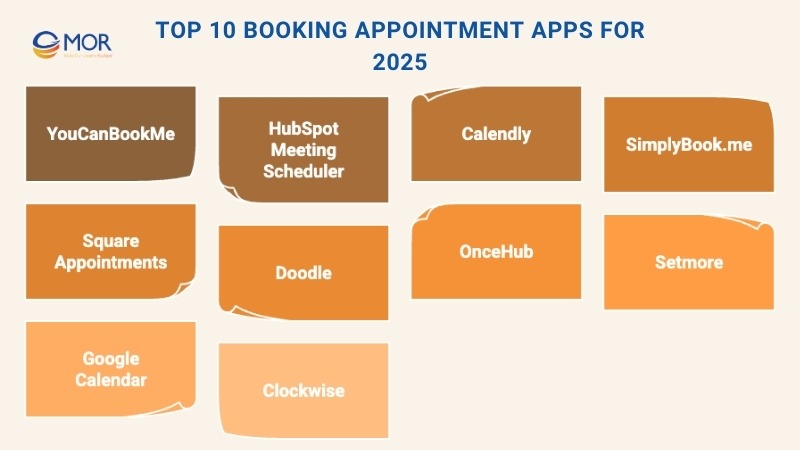
1. YouCanBookMe — Best For Personalized Scheduling
YouCanBookMe Overview
Launched in 2011, YouCanBookMe was designed to simplify scheduling for small businesses and individuals. It quickly became one of the most customizable tools available. From branded booking pages to personalized email reminders, the platform helps create a professional and tailored client experience.
Setup is straightforward with built-in templates, and all configurations are managed in one place. With support for 44 languages and automatic time zone adjustments, YouCanBookMe is a strong booking appointment app for businesses that work across regions and serve international clients.
Pros and Cons
Pros | Cons |
• Highly customizable booking pages • 7,000+ Zapier integrations • Auto-adjusts language & time zone • Pooled availability for teams• Payment support • Free forever plan | • Not ideal for events with 50+ attendees • Limited enterprise-level features |
YouCanBookMe Pricing
- Free – 1 calendar connection, 1 booking page
- Individual – $8.10/month, 2 calendars and 2 booking pages
- Professional – $11.70/month, 6 calendars and 10 booking pages
- Teams – $16.20/member/month, multi-calendar support and role-based access
Use YouCanBookMe if:
- You want a free booking appointment app with simple setup and affordable upgrades.
- You work with clients across languages or time zones and need automatic adjustments.
- You prefer a client booking appointment app that combines strong features with an easy learning curve.
2. HubSpot Meeting Scheduler — Best For Sales Teams
HubSpot Meeting Scheduler Overview
HubSpot Meeting Scheduler is designed for sales teams that want to make booking frictionless. Reps can embed their calendars into emails or web pages, letting prospects pick a time that works instantly. This removes the back-and-forth and speeds up the sales cycle.
The tool syncs directly with HubSpot CRM, so contact records update automatically. It also supports round-robin availability for teams, confirmation and reminder emails, prospect qualifying forms, and meeting analytics. For businesses already using HubSpot, this makes scheduling a seamless part of the sales workflow.
Pros and Cons
Pros | Cons |
• Syncs with HubSpot CRM • Embeddable calendar widget • Built-in spam protection with CAPTCHA • Can accept payments | • Pricing is tied to HubSpot Sales Hub plans • Customization is limited compared to standalone tools |
HubSpot Meeting Scheduler Pricing
The scheduler works as a free booking appointment app with core features included. To unlock advanced scheduling and sales automation, it’s part of HubSpot’s Sales Hub subscription:
- Sales Hub Starter – $15/seat/month: Includes the scheduler plus essential sales tools to shorten cycles and improve close rates.
- Starter Customer Platform – $15/seat/month: Adds marketing, service, content, and operations features alongside scheduling.
- Sales Hub Professional – $90/seat/month: Designed for scaling teams, with automation and advanced reporting.
- Sales Hub Enterprise – $150/seat/month: Full enterprise-level platform with deeper customization, permissions, and analytics.
This tiered model allows companies to start with a booking site free and scale into paid plans as sales teams grow.
Use HubSpot Meeting Scheduler if:
- You’re a sales team that wants to simplify scheduling for prospects.
- You need a booking appointment app that ties directly into your CRM and automation.
- You already rely on HubSpot tools and want scheduling fully integrated.
3. Calendly — Best For Large Teams
Calendly Overview
Calendly was founded in 2013 to cut the back-and-forth of scheduling across different time zones. Today, it’s one of the most recognized names in the market, especially for companies that need to coordinate large teams.
The platform offers workflow automation, over 100 native integrations, and polished booking pages where you can remove Calendly branding for a more professional look. Users can create multiple scheduling links, set round-robin availability, and rely on two-way calendar sync with Google or Outlook.
For enterprises and growing companies, Calendly stands out as a booking appointment app that supports advanced workflows and reporting, though it can feel overwhelming for freelancers or very small teams.
Pros and Cons
Pros | Cons |
• Customizable booking pages • Enterprise-grade workflows • Multiple calendar integrations • Reporting dashboard | • Advanced pooling only on higher plans • Pricing higher than some alternatives • Lacks override controls • No sync with Apple Calendar |
Calendly Pricing
Calendly offers a free plan and three paid tiers:
- Free – Always free for personal use
- Standard – $10/seat/month, designed for professionals and small teams
- Teams – $16/seat/month, recommended for growing businesses needing team-based scheduling
- Enterprise – Starts at $15,000/year, built for large companies with advanced security and compliance needs
Use Calendly if:
- You want a scheduling tool with advanced automation and workflows.
- You’re integrating with CRMs like Salesforce and need strong native integrations.
- You’re part of a large team or enterprise that requires advanced booking controls and has the budget for premium plans.
4. SimplyBook.me — Best For Medical Offices
SimplyBook.me Overview
Launched in 2011, SimplyBook.me was built for service-based industries, with healthcare among its strongest use cases. The platform helps clinics, labs, and medical offices cut down on back-and-forth scheduling with patients by centralizing the entire process in one place.
It provides customizable intake forms, resource and staff management, appointment history tracking, and built-in reporting. There’s also mobile app access so administrators and providers can manage schedules on the go. With support for branded booking pages, multi-language options, and even ticket generation for medical testing, it’s a strong booking appointment app for healthcare.
Pros and Cons
Pros | Cons |
• HIPAA and GDPR compliant • Admin dashboard and reporting tools • Calendar and CMS integrations • Tailored for healthcare providers | • Limited customization • Pricing tied to “custom features” • Booking limits on all plans |
SimplyBook.me Pricing
SimplyBook.me uses a tiered pricing model where many advanced options are treated as “custom features.” Depending on your plan, you can only unlock a set number of these. Even at the Premium level, there’s a booking cap in place.
- Free – €0/month, up to 50 bookings, 1 custom feature, 1 provider
- Basic – €8.25/month (annual), up to 100 bookings, 3 custom features, 5 providers
- Standard – €24.9/month (annual), up to 500 bookings, 8 custom features, 15 providers
- Premium – €49.9/month (annual), up to 2,000 bookings, unlimited custom features, 30 providers
Use SimplyBook.me if:
- You run a medical office or healthcare enterprise that needs HIPAA-compliant scheduling.
- You want a system that combines booking, accounting, and patient data management.
- You’re okay with feature limits but want a secure and healthcare-ready tool.
5. Square Appointments — Best For Multi-Location Services
Square Appointments Overview
Launched in 2014, Square Appointments was designed for service-driven businesses like salons, spas, and personal training studios. It combines scheduling with payment processing and customer management, making it more than just a simple calendar tool.
Core features include invoice generation, automated reminders by text or email, a mobile app for iOS and Android, and integrated payments with Square, Visa, Mastercard, and Discover. It also connects with POS hardware, making in-person checkouts fast and secure. With client directories, customer history tracking, and profile creation, it works well as both a booking appointment app and a customer management system.
Pros and Cons
Pros | Cons |
• AI assistant for customer queries • Strong mobile app • Detailed reporting and customer history • Integrated POS payments | • Limited customization • Higher cost compared to some alternatives |
Square Appointments Pricing
Square’s pricing depends on the number of locations. Businesses with a single site can use the Free plan, but multi-location operators need at least the Plus tier. Processing fees apply on all transactions:
- Free – $0/month, for one location
- Plus – $29/month per location, includes advanced team and service management
- Premium – $69/month per location, built for larger businesses with complex needs
Use Square Appointments if:
- You want an all-in-one tool for scheduling, payments, and customer tracking.
- You run multi-location service businesses and need scalable pricing.
- You already use Square POS technology and want everything integrated.
6. Doodle — Best For Group Scheduling
Doodle Overview
Founded in 2007, Doodle quickly became popular as a simple way to coordinate group meetings. Within just a few years, it had millions of users who needed an easier way to align schedules.
What makes Doodle unique is its polling feature, which lets teams vote on the best meeting time. The platform also integrates with Zoom and Google Meet, syncs with major calendars like Google and Outlook, and allows admins to book on behalf of others. This makes it a reliable booking appointment app for teams that often face scheduling conflicts.
Pros and Cons
Pros | Cons |
• Free forever plan • Simple, intuitive interface • Great for coordinating group meetings • Integrations with Zoom and Microsoft Teams | • Poll customization is limited • Free version shows ads • No custom branding on free plan |
Doodle Pricing
Doodle offers flexible pricing options:
- Free – $0, for individuals needing basic scheduling
- Pro – $14.95/user per month, includes advanced scheduling tools
- Team – $19.95/user per month, designed for collaborative teams
- Enterprise – Custom pricing, with enhanced support and security
Annual billing discounts are available, cutting costs by up to 55%.
Use Doodle if:
- You need a straightforward way to coordinate group meetings.
- You want a polling system that makes it easy to find the best meeting time.
- You’re okay with limited customization but value a tool built for collaboration.
7. OnceHub — Best For Lead Management
OnceHub Overview
Founded in 2006, OnceHub focuses on helping businesses streamline lead engagement. It combines scheduling, chatbots, and automation tools so teams can qualify prospects before booking time with them.
The platform includes workflow builders, analytics dashboards, and white-label branding to customize the client journey. Integrations with Salesforce, HubSpot, and project management tools make it easy to embed into existing workflows. Teams can also route calls based on real-time availability and use chatbots to ask qualifying questions or capture contact details.
With these capabilities, OnceHub is more than a calendar. It’s a booking appointment app designed to boost sales productivity and improve lead handling for B2B and service-based companies.
Pros and Cons
Pros | Cons |
• Free plan available • Strong automation and lead routing • Workflow builder and reporting tools • CRM integrations | • Steep learning curve • Premium plans are costly • Interface can feel complex |
OnceHub Pricing
OnceHub offers a free plan and three paid tiers, each priced per user, per month:
- Basic – Free, for individuals starting with online scheduling
- Schedule – $10/seat/month, professional scheduling features
- Route – $19/seat/month, for routing and qualification
- Engage – $39/seat/month, includes AI-driven chatbots and advanced engagement tools
Use OnceHub if:
- You want to automate scheduling, lead qualification, and engagement.
- You need CRM integrations to align meetings with sales workflows.
- You rely on reporting to refine your sales process and performance.
8. Setmore — Best For Online Classes And Webinars
Setmore Overview
Launched in 2011, Setmore was built to simplify how professionals, educators, and service providers manage appointments. Its clean design and wide integrations make it a flexible tool for classes, webinars, and customer bookings.
Key features include one-click scheduling, automated confirmations and reminders, payment support via Stripe, PayPal, and Square, plus two-way calendar sync with Google and Office 365. Setmore also integrates with Shopify, Squarespace, Zoom, QuickBooks, and more than 30 other tools. Users can even accept bookings directly from social media or their website.
With these features, Setmore is a practical booking appointment app for businesses that run group sessions, online classes, or recurring events.
Pros and Cons
Pros | Cons |
• Free for up to 4 users • Mobile and desktop apps • Contactless payment support • 24/7 human support | • Reporting and analytics are limited • Booking form can feel cluttered • No round-robin scheduling option |
Setmore Pricing
Setmore offers a free plan for up to 4 users, making it a strong entry point for small teams or solo users. Paid plans unlock advanced features at affordable rates:
- Free – $0/user per month, up to 4 users
- Pro – $12/user per month, for 1–2 users
- Team – $9/user per month, unlimited users
Annual billing reduces costs by up to 58%.
Use Setmore if:
- You run webinars, classes, or group training sessions and need recurring bookings.
- You want a low-cost, easy-to-use scheduler with strong integrations.
- You work across time zones and want clients to self-schedule easily.
9. Google Calendar — Best For Google Users
Google Calendar Overview
First launched in 2006, Google Calendar has become the default scheduling tool for millions. Recently, Google added its own appointment scheduling function within Google Workspace, allowing users to create public booking pages directly from their calendar.
Key features include integration with Gmail, Google Meet, and Drive, the ability to share multiple calendars, drag-and-drop scheduling, and automatic reminders. Google Appointment Scheduler also supports different appointment types and even basic payment collection. For anyone already using Google Workspace daily, it’s an easy booking appointment app to adopt.
Pros and Cons
Pros | Cons |
• Deep integration with Google tools • Syncs automatically across devices • Supports collaborative calendar sharing • Built-in reminders | • Limited customization • Not ideal for Microsoft-focused users • Missing advanced features like round-robin scheduling and SMS alerts |
Google Calendar Pricing
The standard version of Google Calendar includes one booking page with a single appointment type. For more advanced scheduling, you’ll need a Google Workspace plan:
- Business Starter – $6/user per month
- Business Standard – $12/user per month (most popular)
- Business Plus – $18/user per month
- Enterprise – Custom pricing, contact sales
Use Google Calendar if:
- You rely on Gmail, Google Drive, and Meet daily.
- You want one calendar that merges personal and work schedules.
- You need a simple scheduling tool and don’t require advanced analytics or branding.
10. Clockwise — Best For Focused Work
Clockwise Overview
Founded in 2016, Clockwise was designed to help professionals take control of their calendars. Instead of just booking meetings, it uses AI to restructure schedules and protect focus time, making it less of a traditional scheduler and more of a productivity assistant.
Clockwise automatically reschedules meetings to free up deep work time, blocks breaks, and provides analytics on how teams spend their hours. It integrates with Google Calendar, Microsoft Outlook, Slack, Zoom, and Asana. While it isn’t the strongest booking appointment app for external client meetings, it excels at managing internal workflows and reducing meeting overload.
Pros and Cons
Pros | Cons |
• Smart AI to protect focus time • Automatic rescheduling • Time analytics and insights • Strong integrations with Google and Slack | • Weak external booking features • Limited to Google and Outlook calendars |
Clockwise Pricing
Clockwise offers flexible plans:
- Free – $0/user per month, for basic smart calendar management
- Teams – $6.75/user per month (billed annually), adds advanced focus time protection
- Business – $11.50/user per month, includes organization-wide analytics and controls
- Enterprise – Custom pricing, with enhanced security and provisioning
Use Clockwise if:
- You want an AI assistant that automatically optimizes meeting times.
- You need analytics to measure how much time your team spends in meetings.
- You’re focused on productivity and minimizing meeting disruptions.
Key Features To Look For In A Booking Appointment App
To build a reliable and user-friendly booking appointment app, certain features are non-negotiable. These functions not only improve customer convenience but also make scheduling smoother for businesses.
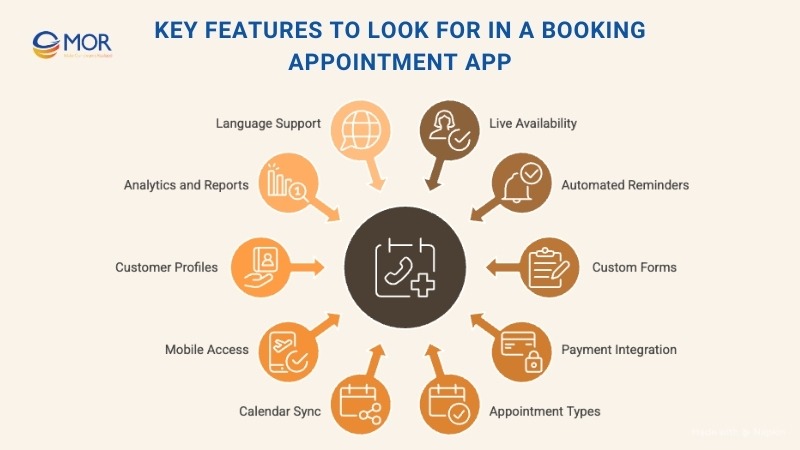
Live Availability
Clients need to see when a provider is free before committing to a time. Real-time calendar updates prevent double bookings and eliminate confusion, making the process simple for everyone.
Automated Reminders And Notifications
A strong benefit of book appointment app is the ability to send reminders. Whether by email, SMS, or push notification, these alerts reduce missed appointments and keep both staff and clients on schedule.
Custom Forms For Booking
Every business has unique requirements. A good booking tool lets you design forms that collect important details such as names, contact info, and specific service requests, ensuring each appointment is tailored to the client.
Payment Integration
A modern booking appointment app should support built-in payment gateways. Allowing customers to pay with credit cards or mobile wallets while booking saves time and speeds up the process for both businesses and clients.
Variety Of Appointment Types
Businesses often need more than one type of booking. Whether it’s consultations, classes, or recurring services, the system should let you set categories, adjust time slots, and assign different costs with ease.
Calendar Sync
Syncing with external calendars like Google or Outlook is essential. It keeps schedules aligned, prevents double bookings, and makes it easier to manage commitments outside the app.
Mobile Access
Many clients prefer to book or change appointments on their phones. A mobile-friendly interface ensures the experience is smooth across devices and encourages repeat use.
Customer Profiles And History
Tracking appointment history helps businesses offer personalized services. This is especially valuable in healthcare, beauty, and other industries where clients book regularly.
Analytics And Reports
Data matters. A best app for booking appointments should provide reports on appointments, cancellations, revenue, and average session times. These insights guide better decisions and service improvements.
Language And Time Zone Support
For companies working internationally, flexibility is key. Support for multiple languages and automatic time zone adjustments makes the app usable across borders.
How To Choose The Right Booking Appointment App
With so many tools available, finding the right fit can feel overwhelming. A step-by-step approach helps narrow down options and makes sure the app matches your workflow.
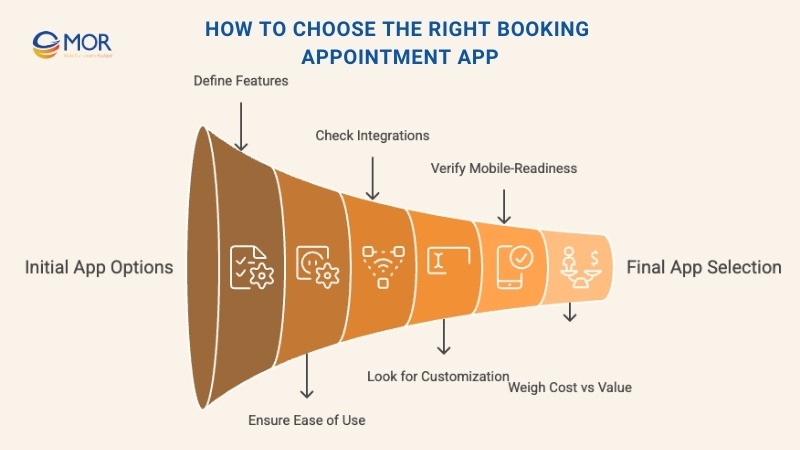
Step 1: Define Must-Have Features
List out what your booking appointment app needs to handle. Is it online booking, automated reminders, or payment integration? Do you need it for one-on-one sessions, classes, or team scheduling? Knowing your priorities makes the search faster.
Step 2: Focus On Ease Of Use
The platform should be simple for you and your clients. Look for intuitive navigation, drag-and-drop scheduling, and a clean interface. If clients can book without confusion, you’ve found a strong candidate.
Step 3: Check Integration Options
Your tools should work together, not in isolation. Pick a booking appointment app that connects with calendars, CRMs, payment systems, and video platforms like Google Calendar, Outlook, Zoom, or PayPal. This saves time and keeps everything synced automatically.
Step 4: Look For Custom Settings
No two businesses run the same way. The app should let you set booking limits, collect notes, and schedule recurring appointments. Flexibility matters, the software should adapt to your process, not force you to adjust.
Step 5: Make Sure It’s Mobile-Ready
Both you and your clients are often on the move. The best scheduling tools work seamlessly across phones, tablets, and desktops. That way, clients can book from anywhere, and you can manage your calendar without being tied to a desk.
Step 6: Weigh Cost Against Value
A low price may look appealing but often leaves out essentials like reminders or integrations. Review what each plan actually includes. Sometimes paying a bit more upfront saves time and money in the long run. Always test the free trial first.
Step 7: Read User Reviews
Real feedback speaks volumes. Check what similar businesses say about setup, usability, support, and reliability. Reviews often reveal details like how smooth the mobile app is or how responsive customer support can be.
Custom Booking Appointment App Development With MOR Software
Off-the-shelf schedulers often fail when business workflows don’t fit a standard mold. That’s why more organizations now choose a custom booking appointment app designed to match their exact processes.
At MOR Software, we build flexible and secure scheduling platforms for industries such as healthcare, education, retail, and coworking. Our solutions scale as your business grows and include features like tailored booking forms, secure payments, calendar sync, multi-language support, and cross-platform access on iOS, Android, and web.
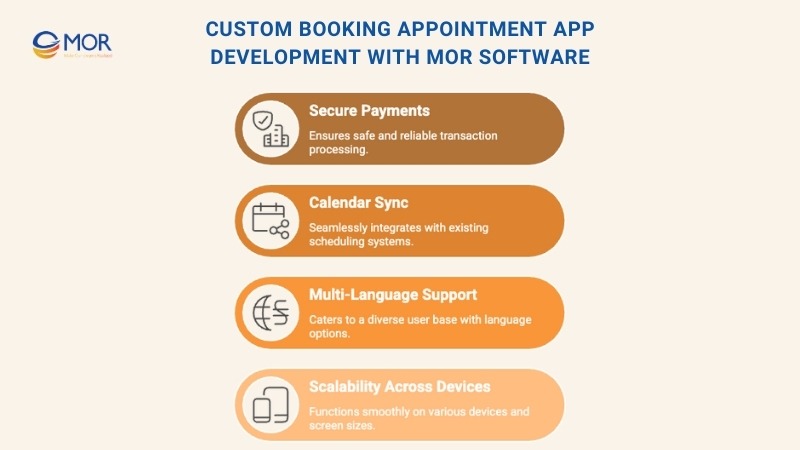
Case Study 1: SpaceShare – Coworking And Office Booking
MOR worked with SpaceShare to deliver a booking platform for coworking and office spaces. The system included mobile and web access, automated check-ins with camera integration, and real-time synchronization. Built on AWS with advanced analytics, the solution improved the user experience and gave partners data-driven insights for growth.
Case Study 2: Online Healthcare Consultation – Telemedicine In Japan
A major Japanese clinic wanted to extend services with telemedicine. MOR developed a mobile app for patients, a web portal for doctors and pharmacies, and an admin system for managers. With secure video calls, prescription coordination, and AWS-backed scalability, the platform improved patient access to care and streamlined doctor–patient interactions.
These examples highlight how MOR goes beyond scheduling. We create platforms that not only handle bookings but also strengthen operations and deliver better customer engagement.
Conclusion
The right booking appointment app does more than keep a calendar in order. It saves time, reduces missed meetings, and creates a smoother experience for clients. Whether you choose a free starter tool or an advanced enterprise platform, the best option is always the one that aligns with your workflows and long-term goals. Contact MOR Software today to see how a tailored solution can power your growth.
MOR SOFTWARE
Frequently Asked Questions (FAQs)
What is the best appointment booking app?
Some of the best booking appointment apps in 2025 are YouCanBookMe, HubSpot Meeting Scheduler, Calendly, SimplyBookMe, Square Appointments, Doodle, OnceHub, and Setmore. These apps stand out for their flexibility, features, and ease of integration with business workflows.
Which booking app is easiest to use?
Calendly is often considered the easiest booking appointment app thanks to its clean interface and simple setup. Other beginner-friendly tools include Acuity Scheduling, Setmore, Bookafy, SimplyBook.me, Appointlet, YouCanBookMe, and Square Appointments. Each one is designed for smooth scheduling without technical challenges.
Which online booking system is best?
The best online booking appointment apps vary by business needs. Acuity Scheduling is excellent for ease of use, Setmore is highly customizable, Square Appointments is great for mobile bookings with payment integration, SimplyBook.me is perfect for global businesses, and YouCanBookMe is one of the best free scheduling options.
How to create an appointment booking system?
To set up your own booking appointment app system, you can:
- Create your schedule in Google Calendar.
- Decide which times you want to make available.
- Add the meeting location or online link.
- Limit last-minute or too-early bookings.
- Add buffer time between sessions.
- Set a daily limit for total appointments.
What is the best free scheduling app?
If you want a free booking appointment app, top choices include Setmore with a strong free plan, SimplyBook.me for stylish booking pages, Calendly with unlimited appointments, MeetFox (Brevo Meetings) with built-in video tools, and Zoho Bookings for recurring and group bookings.
How to choose the right scheduling app?
When choosing a booking appointment app, focus on customization, branding, and features that match your business. The right app should not only streamline scheduling but also deliver a seamless client experience that reflects your brand identity.
Rate this article
0
over 5.0 based on 0 reviews
Your rating on this news:
Name
*Email
*Write your comment
*Send your comment
1